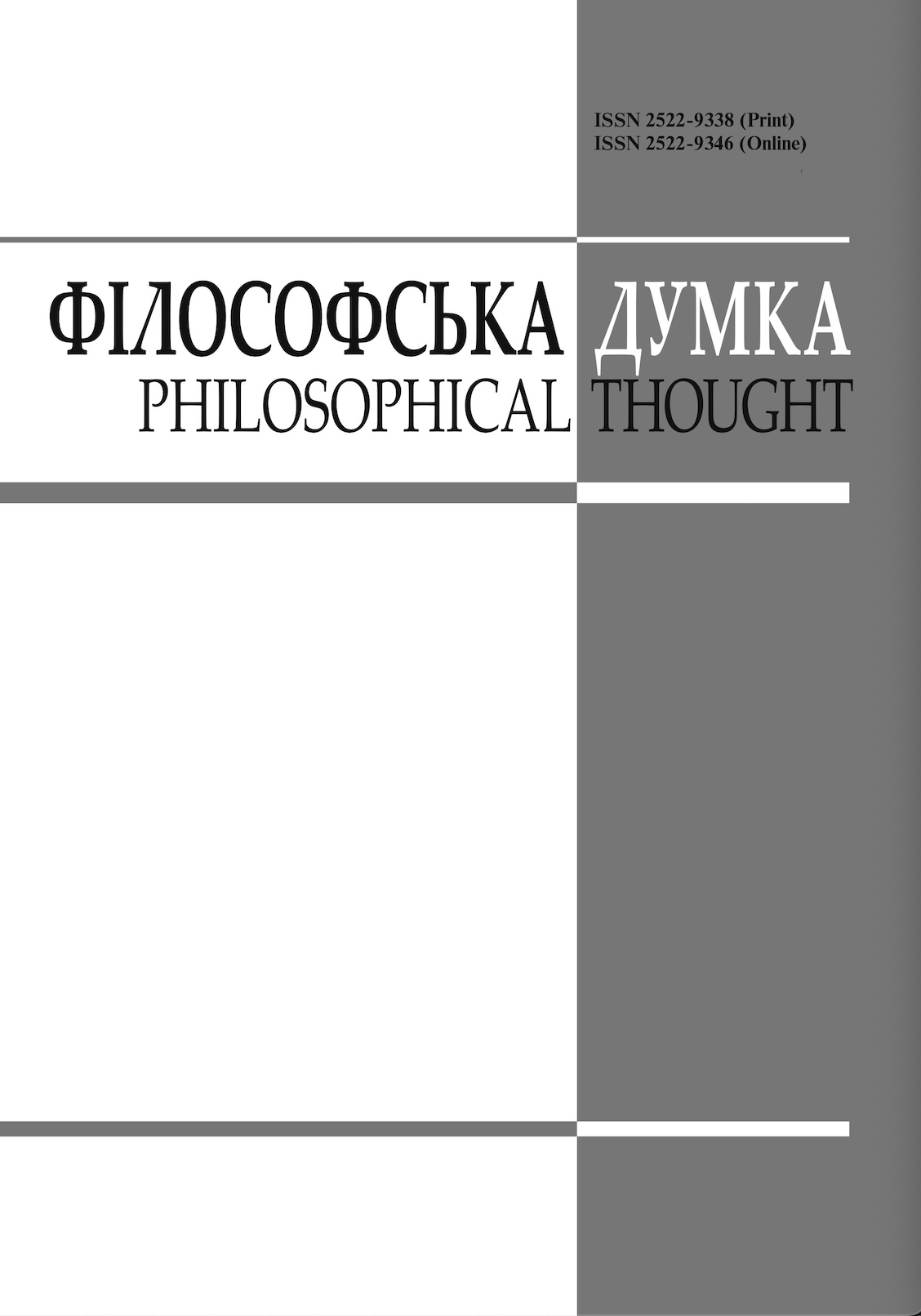“THEOLOGY AFTER...” or CHRISTIANITY IN A WORLD OF UNREFUTED CLAIMS
Strokes to “theology after Bucha”
DOI:
https://doi.org/10.15407/fd2025.02.102Keywords:
Christianity, Judaism, Bible, theology after Auschwitz, theology after Bucha, Holocaust, genocide, Russo-Ukrainian warAbstract
Today, Ukrainian churches began to consider the possibility of "theology after Bucha", asking practically the same questions that Christians and Jews were concerned with after World War II. As then the main question was "Where was God at Auschwitz?" Now the question is where Biblical God was during Bucha genocide, and in a broader context, where God is with His love and mercy in Ukraine after February 24, 2022. The article is nearly the first scientific research of the faith-based component in Ukrainian academic religious studies during the ongoing Russo-Ukrainian war. The subject of the article is relatively new research area for Ukrainian scientists, since "theology after Bucha" is, so to speak, a working concept, one of the possible names for the theological direction inherent in post-war Christianity in Ukraine. The author examines the conditions for the foundation of a new theological system in the realm of Ukrainian Christianity after the victory over rushism, following the example of the theology after the Holocaust/Shoa in Western Christianity after WWII. The article analyses a number of caveats that, if not addressed today, could make the constructive development of the abovementioned theology impossible. The author predicts possible parallels between "theology after Auschwitz" and the future "theology after Bucha". In fact, “theology after Auschwitz" did not radically affect Western, primarily European Christianity after 1945 because it did not provide unambiguous answers to a range of urgent essential questions related to the existence of a believer in the world recovering from the great war. So, with a considerable degree of probability (already evident from the remarks of individual representatives of different religious denominations) there is concern that "theology after Bucha" may fail practically at its beginnings, becoming a "pure theory", having no chances to be applied at the all-Christian level. It is partially clear today that an attempt would be made to launch "theology after Bucha" exactly along the ideological tracks of "theology after Auschwitz", that is, to direct it exclusively to the search for the arguments shifting the burden of responsibility for "Bucha" away from God and thereby possibly save Christianity from the ideological crisis it experienced in Ukraine after February 24, 2022. The author concludes that if "theology after Bucha" really begins to move along the similar ideological fairway like "theology after Auschwitz", the post-war Christianity in Ukraine will face a disappointing perspective to lose social relevance and, as a result, will be radically reduced to ritualism.
References
Adorno, Th. (2019). Education after Auschwitz. [In Ukrainian]. Philosophy of Education, 2(25), 82-99. Retrieved from: https://doi.org/10.31874/2309-1606-2019-25-2-4
Apocalypse, Auschwitz, absence of God. (s.a.). [In Russian]. Ja-Thora. Retrieved from: https://ja-tora.com/apokalipsis-osvencim-otsutstvie-bog/
Berkovitz, E. (s.a.). Faith after the Holocaust. [In Russian]. You-books.com. Retrieved from: https://www.you-books.com/book/E-Berkovich/Vera-posle-Katastrofy
Davydiuk, V. (2023). The other side of war. [In Ukrainian]. Za Viru Yevanhelsku, 1(251), January, 1, 5. Retrieved from: https://www.chve.org.ua/wp-content/uploads/2023/02/№1-251_WEB.pdf
Fackenheim Emile (1970). God's Presence in History: Jewish Affirmations and Philosophical Reflections. New York: New York University Press.
Frankl, V.E. (1988). Man's search for meaning. Revised and Updated. New York: Washington Square Press.
Kalyna, O. (2022). Why did God allow war in Ukraine? [In Ukrainian]. Tserkva Dim Yevahelia, 26 August, Friday. Retrieved from: http://baptist.vn.ua/blog/item/14-chomu-v-ukraini-viina
Katz, S.T. (1983). Post-Holocaust Dialogues: Critical Studies in Modern Jewish Thought. New York University Press.
Kovalenko, H. (2022). Bucha: Where was God and whether He exists at all? [In Ukrainian]. RISU - Religious Information Service of Ukraine, 04.04.2022. Retrieved from: https://risu.ua/bucha-de-buv-bog-i-chi-ye-vin-vzagali_n127979
Lezov, S. (1990). National idea and Christianity. Experience in two parts: Christianity after Auschwitz. [In Russian]. Oktiabr', 10, 148-160.
Marquardt, F.-W. (1979). Christsein nach Auschwitz. Freiburger Rundbrief. Beiträge zur christlich-jüdischen Begegnung, XXXI(117-120), 87-94.
Matveichev, O. (2022). What is Ukraine punished by God for?. [In Russian]. Livejournal, August 22. Retrieved from: https://matveychev-oleg.livejournal.com/13840115.html
Order of the XXV World Russian People's Council "The Present and Future of the Russian World». (2024). [In Russian]. Patriarchate.ru, March 27. Retrieved from: http://www.patriarchia.ru/db/text/6116189.html
Rubenstein, R.L. (1966). After Auschwitz: Radical Theology and Contemporary Judaism. The Bobbs-Merrill Company.
Spiritual causes of Russia's war against Ukraine. From Andrew the First-Called to Volodymyr the Great. (2023). [In Ukrainian]. Za Viru Yevanhelsku, 8(258), August, 3, 5. Retrieved from: https://www.chve.org.ua/wp-content/uploads/2023/09/№8-258_WEB.pdf
Sukovata, V. (2010). "Philosophy after Auschwitz": reflexions of war violence in Western and post-Soviet consciousness. [In Ukrainian]. Sociology: Theory, Methods, Marketing, 2, 112-131.
Sukovataya, V. (2012). "Philosophy after Auschwitz" and "ethics after the Holocaust": reflections of the Nazi genocide in the Western and post-Soviet consciousness. [In Russian]. In: Materials of the International Conference "Crimes of Totalitarian Regimes in Ukraine: Scientific and Educational Perspectives" (November 21-22, 2009, Vinnytsia) (сс. 107-133). Kyiv: NIOD Institute for War, Holocaust and Genocide Studies; Royal Netherlands Academy of Arts and Sciences; Ukrainian Center for Holocaust History Studies.
Tillich, P. (1951). Systematic Theology. Vol. I. Chicago: The University of Chicago Press.
Where was God during the Holocaust? (2016). [In Russian]. Jewish News, 27 January. Retrieved from: https://jewishnews.com.ua/ community/gde-byil-bog-vo-vremya-xolokosta
Why did God allow the Holocaust? (s.a.). [In Ukrainian]. Svidki Yehovy. Retrieved from: https://www.jw.org/uk/біблійні-вчення/ запитання/чому-бог-допустив-голокост/
Zahrebelnyi, I. (s.a.). Do we need a "new theology after Bucha". [In Ukrainian]. Politychna Teolohia. Retrieved from: https://politteo.online/materialy/chy-potribna-nam-nova-teologiya-pislya-buchi/
Downloads
-
PDF (Українська)
Downloads: 24
Published
How to Cite
Issue
Section
License
Authors who publish with this journal agree to the following terms:
- Authors retain copyright and grant the journal right of first publication.
- Authors are able to enter into separate, additional contractual arrangements for the non-exclusive distribution of the journal's published version of the work (e.g., post it to an institutional repository or publish it in a book), with an acknowledgement of its initial publication in this journal.
- Authors are permitted and encouraged to post their work online (e.g., in institutional repositories or on their website) prior to and during the submission process, as it can lead to productive exchanges, as well as earlier and greater citation of published work (See The Effect of Open Access).


